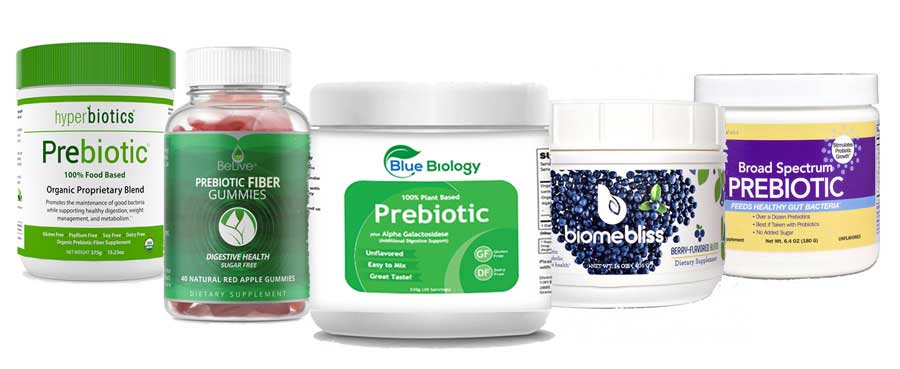Can you Take Prebiotics and Probiotics Together?
Prebiotics are the indigestible fiber that nourishes the beneficial bacteria in your gut. So. you should combine probiotics and prebiotics? Well, prebiotics help probiotics thrive, so you certainly can combine them. Food items or supplements that comprise both probiotics and prebiotics are referred to as synbiotic.
The great news is that almost everyone can use them regularly. By consuming a prebiotic/probiotic-rich diet, you benefit your digestive health, support your immune health, and fight infections. Vegetarian prebiotics are exceptionally safe, and they also offer extra nutritional value.
If a healthier digestive system and a stronger immunity is something you would like to benefit from, then the prebiotic/probiotic combo is perfect for you. Consult your doctor before you start taking any synbiotic supplements.
Prebiotics vs. Probiotics
Probiotics and prebiotics sound similar, but these two are very different, and their roles in your digestive system are also different.
Prebiotic Fiber
Prebiotics are indigestible fiber found in various foods like asparagus, Jerusalem artichoke, garlic, onions, bananas, apples, beans, chicory root, and many others. The fiber glides through your digestive system without being digested until it gets to the large colon where it’s fermented.
The probiotics in your gut ferment the prebiotics and then use them as an energy source. Fermentation generates calcium, magnesium, and fatty acids from your food and prevents pathogenic micro-organisms from overwhelming your system.
So, in a nutshell, prebiotics boost the number of beneficial bacteria in your gut linked with reduced disease risk and better health.

Probiotics
Probiotics are beneficial bacteria that are naturally created during fermentation in yogurt, miso soup, sauerkraut, kimchi, and other foods. You can also take probiotics in supplement form as well as ingredients in various products like yogurt.
The use of probiotics and prebiotics together are referred to as microbiome therapy. While you don’t have to take prebiotics to benefit from probiotics, combining them makes probiotics much more effective.
Synbiotic
When food sources come with both probiotics and prebiotics, that combination is referred to as synbiotic. Synbiotic foods include kefir, cheese, and some types of yogurt. You can also get prebiotics in the form of capsules or commercial food additives. They come in powder and liquid forms.
Benefits of Prebiotics
Research shows that prebiotics help increase the number of beneficial bacteria in the gut that bolster general well-being and reduce disease risk. [Florowska 2016] Unlike fragile probiotics, prebiotics are not impacted by time, stomach acids, and heat. And, the fermentation process doesn’t differ for each individual.
Research shows that increasing your consumption of prebiotic fiber will improve your digestive health, immunity, brain health, and bone density. Besides, when probiotics are added to the formula, the blend resembles the content of healthy breast milk.
Some studies also indicate that probiotics and prebiotics are useful in treating allergic disorders, irritable bowel syndrome, diarrhea, and even common cold.
A combination of probiotics and prebiotics is also suggested to be useful in the treatment of obesity. They are also being assessed as a means of limiting cancer spread.
Should You Take Supplements or Opt for Fermented and Fiber-rich Food?
It’s vital to nourish the beneficial bacteria colony in your colon. You should start with a healthy diet foundation, starting with eating fresh, organic fruits and vegetables and avoiding sugary foods and drinks and processed food products.
Unfortunately, the typical modern diet includes lots of sugar, synthetic ingredients, and processed foods. We don’t get to eat enough fiber-rich and fermented foods. Adding probiotics and prebiotic supplements to your diet can, therefore, be healthy and vital. [Verspreet 2016]

Vegan Prebiotic Rich Foods
- Chicory Root: the chicory root comprises of 65% fiber by weight; it’s thus incredibly rich in prebiotic fiber.
- Garlic and Onions: there are two grams of fiber for every a half a cup of onion or garlic – 17 percent prebiotic fiber.
- Oatmeal: for every half a cup, there are two grams of fiber – lots of prebiotic fiber content.
- Wheat bread that contains wheat bran: one gram of fiber for every slice – about 70 percent of wheat bran fiber is prebiotic fiber.
- Asparagus – two to three grams prebiotic fiber for every a half a cup or 100-gram serving.
- Dandelion greens – for every 100-gram serving, there are four grams of fiber, most of which is prebiotic.
- Jerusalem artichoke – for every 100-gram serving, there are 2 grams of fiber – over 70 percent of this is prebiotic inulin fiber.
- Barley – three to eight grams of prebiotic fiber for every 100-gram serving.
- Apple with skin – two grams of fiber for every half of an apple (much of it in the skin). About 50% of the apple fiber is Pectin, which has tremendous prebiotic benefits.
Side Effects and Risks of Probiotics and Prebiotics
The CDC (Center for Disease Control and Prevention) points out that, for healthy people, commercial probiotics, prebiotics, and synbiotics are generally safe.
But in some rare cases, healthy individuals may become sick after consuming these supplements. Prebiotics, probiotics, and synbiotics are not regulated by the FDA (the US Food and Drug Administration). This means the live bacteria in probiotics are not assessed according to thorough safety measures.
Once you start your synbiotic regimen, you may experience common side effects like constipation, gas, loss of appetite, and loose stool. This especially happens at the beginning of your regimen. Cases of acid reflux and boating have also been reported.
Besides, probiotics can trigger dangerous allergic reactions. If you experience severe stomach pain or have a hive breakout after consuming prebiotics, probiotics, or synbiotics, you should quit taking the supplements immediately. Contact your doctor to help you figure out the best course of action.
Synbiotics or a combination of prebiotics and prebiotics may help kids take antibiotics, but you should consult your kid’s doctor first before you give them these probiotics.
Prebiotics and probiotics are considered safe during breastfeeding and pregnancy. But you should get a clearance from your doctor before you take any supplements postpartum or during pregnancy.
References
Florowska A, K Krygier, T Florowski, and E Dłużewska. 2016. “Prebiotics as functional food ingredients preventing diet-related diseases.” Food & function 7(5):2147-55.
Verspreet J, B Damen, WF Broekaert, K Verbeke, JA Delcour, CM Courtin. 2016. “A critical look at prebiotics within the dietary fiber concept.” Annual review of food science and technology Feb 28 (7):167-90.